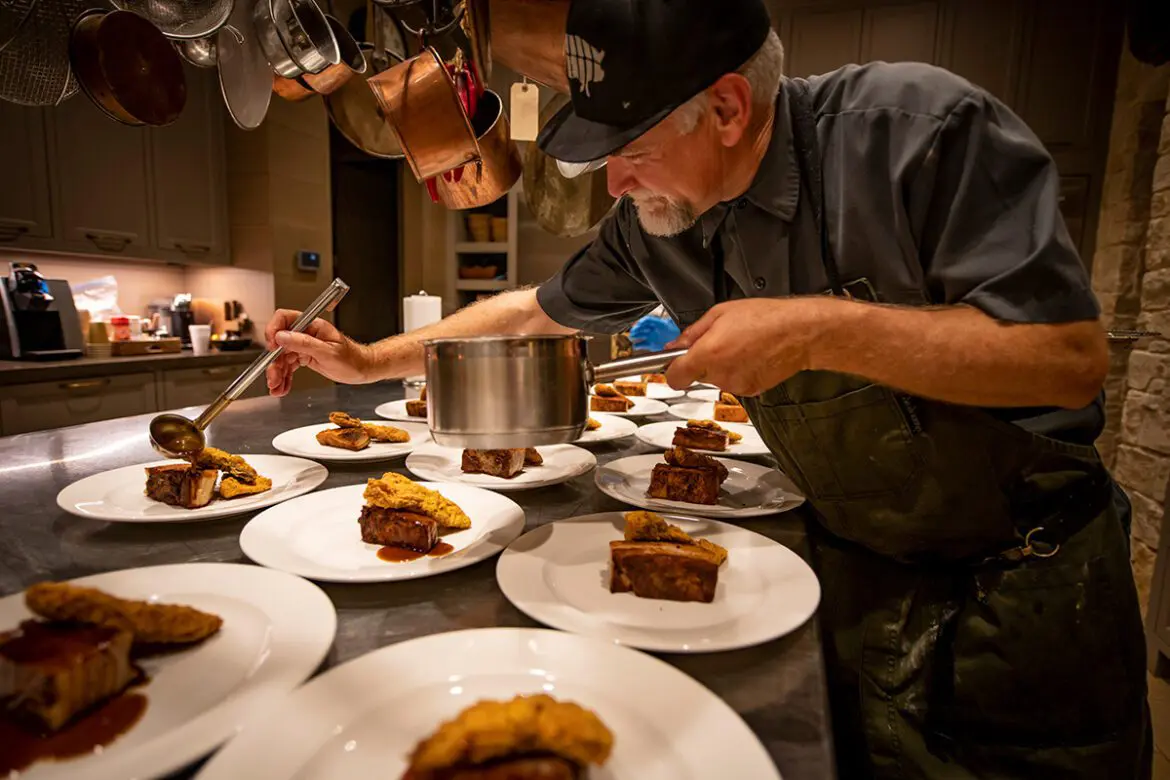At Spread Oaks Ranch, northwest of Bay City, you can often find a chef who strives to push the boundaries of traditional wild game cooking by thinking outside the box. Ric Rosser feels the skillset he has developed over the years as an avid outdoorsman has helped him perfect his craft in the kitchen throughout his 30-year career as a professional chef.
Originally from Bryan, Rosser started shooting a bow at only 4 years old. As soon as he was old enough, he started bowhunting with his dad.
His culinary career began while working in fine dining at the age of 19. He decided to enroll in culinary school, moved to Houston and obtained a Culinary Arts degree from the Art Institute of Houston. After graduating, he spent the first portion of his career working as a chef for different restaurants and entities where he gained a wide range of skills and experience.
“Culinary school gave me a great foundation to begin my career, but the knowledge I have acquired over the years truly came from other chefs who challenged me to push myself in the kitchen,” Rosser said.
Rosser said his background in hunting gave him an edge on other chefs, as he had familiarity in areas other chefs found themselves feeling uncomfortable.
“Because I was a hunter, I already had a lot of experience and knowledge about butchering and muscle groups,” Rosser said. “Nowadays, it has become popular to cook a whole muscle group or a whole animal like a pig, but that wasn’t the case in the culinary world 10-15 years ago. Fortunately, I was pretty good at it because it was something I had been doing my entire life.”
Cooking has never been just a job for Rosser, but rather something he has always incorporated into his everyday life. When his two sons started duck hunting with him, he would cook fairly elaborate meals on the tailgate of his truck after the hunt. Refusing to simply grab some fast food on the way home, he instead wanted to show his boys the importance of enjoying and eating good food, no matter where life might take them.
What Rosser finds special about wild game cooking, though, is the field-to-table aspect. While the cooking world puts a lot of emphasis on knowing where meat comes from, he feels that nobody understands the cut of meat they’re consuming better than a hunter.
“As hunters, we study the animals that we pursue, and in some instances, we even obsess over them,” he said. “We know where that animal has been, what it has been eating, and sometimes we even spend years observing that animal before we ever harvest it. There’s way more depth there than just purchasing a cut of beef at the store that has a label on it that says ‘grass-fed.’ Knowing where your meat comes from goes well beyond what’s written on any label.”
According to Rosser, passion and emotion play a huge role in cooking wild game, especially that which you harvested yourself. For example, he said he could easily prepare steaks for guests, and that they would most likely enjoy them. However, he would be much more enthusiastic about cooking duck from a duck hunt he was on, or venison from a memorable deer hunt.
The seasoned chef enjoys challenging himself to find foods that pair well with wild game. He recently discovered that black-eyed peas and dove are an excellent combination. He has also recently enjoyed experimenting with aging certain forms of wild game meat like venison from white-tailed deer.
“My goal in the kitchen is to press the culinary boundaries of what wild game is really known for,” Rosser said. “It’s a fun and exciting journey, and there’s never a dull moment.”
Rosser said the network of contacts and friends he has developed through the hunting community at Spread Oaks Ranch continually helps him come up with new ideas for wild game recipes.


